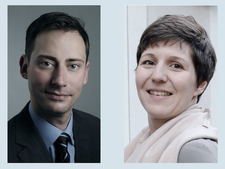-
Topics
subnavigation
Topics
Electromagnetic fields
- What are electromagnetic fields?
- Static and low-frequency fields
- Radiation protection relating to the expansion of the national grid
- High-frequency fields
- Radiation protection in mobile communication
Optical radiation
Ionising radiation
- What is ionising radiation?
- Radioactivity in the environment
- Applications in medicine
- Applications in daily life and in technology
- Effects
- What are the effects of radiation?
- Effects of selected radioactive materials
- Consequences of a radiation accident
- Cancer and leukaemia
- Genetic radiation effects
- Individual radiosensitivity
- Epidemiology of radiation-induced diseases
- Ionising radiation: positive effects?
- Risk estimation and assessment
- Radiation protection
- Nuclear accident management
- Service offers
-
The BfS
subnavigation
The BfS
- About us
- Science and research
- Laws and regulations
- BfS Topics in the Bundestag
- Links
New tasks and projects assigned to Federal Office for Radiation Protection by World Health Organization (WHO)
Year of issue 2014
Date 2014.03.18
Date 2014.03.18
The World Health Organization (WHO) have strengthened their collaboration with the Federal Office for Radiation Protection (Bundesamt für Strahlenschutz, BfS): for the third time in succession, WHO reappointed BfS as WHO collaborating centre and enlarged the areas of cooperation at the same time. For the first time, the BfS is an official partner in the area of "development and implementation of standards and guidelines". As for the areas already established, numerous new projects add to the established collaboration.
"We are pleased about this recognition of our scientific work in the field of radiation protection,"
said BfS President Wolfram König, appreciating the WHO decision. "As a WHO collaborating centre the BfS has a share in improving radiation protection for man and environment, both on the international level and in Germany. For example, the BfS, in cooperation with WHO, will develop criteria to protect patients from unnecessary X-rays non-serious preventive health care services."
This aimed at substantiating the general conditions under which X-rays for individual early detection of diseases could be permissible, or inadmissible, in the absence of a concrete suspicion of disease. König: "There is no precise guidance as to this question. As a result, there is a grey area where not only reasonable examinations are provided but also medically inadequate checkups. This applies for instance to the so-called 'manager check-up', where CT-examinations involving high radiation exposure are offered to entire groups of individuals without any disease being suspected."
As a collaborating centre, the BfS supports WHO in a total of seven areas of research and projects addressing the assessment and evaluation of radiation risks, their communication and the development of international safety standards and technical guidelines, i.e.:
- Radiation risks in the low dose range,
- Biological dosimetry,
- Electrical, magnetic and electromagnetic fields,
- Optical radiation,
- Radon,
- Medical radiation exposure,
- Development and implementation of standards and guidelines.
The tasks addressed by the BfS in cooperation with WHO have grown continuously since the beginning of collaboration in 2006. The reappointment now also involves a new work area: "Development and implementation of standards and guidelines". The related working programme involves a revision of the WHO Guidelines for drinking-water quality, which include recommendations for maximum limits of radioactive substances in drinking-water. In the field of "optical radiation" WHO draws on the BfS expertise within the scope of a new project: WHO recommendations are intended to be issued for the wide-spread use of lasers in the wellness sector.
"Biological dosimetry" enables to determine whether and to what extent an individual has been exposed to radiation. This allows to assess radiation exposure (dose) of individuals after a radiation accident, if other methods of dose assessment do not provide sufficient results. The BfS is the central body for dose assessments based on biological dosimetry in Germany. Within the scope of its collaboration with WHO, the BfS intends to give support to countries willing to build up expertise in biological dosimetry by making available BfS data for training purposes.
The WHO collaborating centres are institutions appointed by the Director-General, committed to giving active support the WHO programmes in all ranks as part of an international cooperation network.
State of 2014.03.18



